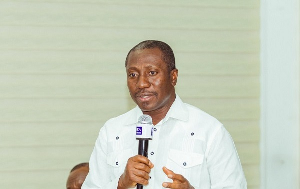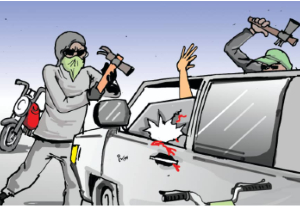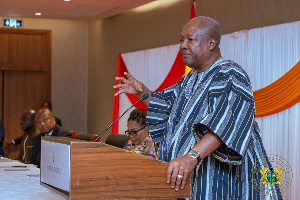The President will return home to a celebration of the country’s 45th ndependence anniversary and a sudden realisation of the people that the rule of law must work in the country.
This is echoed rather loudly in the government’s reaction to the Supreme Court ruling of Feb.28th which ruled as unconstitutional and without jurisdiction, the establishment of Fast Track Courts in the country.
This constitutional interpretation coming just after the police in a standoff had bloodied students of Accra polytechnic
on a march to present a petition to acting President Peter ala Adjetey, has triggered the alarm among the conservative supporters of the president. The alarm is surely well founded in the face of the desire by certain persons to see the Feb. 28th ruling in a political light.
Predictably, the government has endorsed the move by the Attorney-General to seek a review which the AG did even before he gained access to and studies the submissions of the nine judges who sat on the case at the Supreme Court. Face saving though this may be, it is perceived that it is one smart political ploy to test the resolve of the law.
To most of these persons, Tsatsu’s invocation of the constitution has greatly dented the perception that the present political super structure is the true proponent of the rule of law. And their anger is that an indecent haste on the part of the Attorney General and the Director of Public Prosecution seem to have ridiculed that position of apparent superiority.
Most people, however, saw the ruling as a solid foundation towards the desire to completely break away from the old order into a real positive change. Thus making nonsense, any attempt to score hollow political points. Questions raised by this group include how any prosecution could prefer a charge that had no legal basis at the time the crime was purported to have been committed and still expect it to hold.
Their only explanation is that it is a residue of the past order. Constitutional experts informed the Network Herald that it would indeed be most difficult to review the case any other way than it stands now except a tenth judge is added to the nine who sat on the original case and came out with a 5-4 verdict. The real thing to them is for the AG’s office and the office of the Director of Public Prosecution to strengthen their stance following constitutional processes.
...But Kwamena Bartels thinks otherwise
The Minister for Private Sector Development, Mr. Kwamena Bartels, MP has expressed fears that the abolishing of the Fast Track Court (FTC) following last Thursday’s Supreme Court ruling, might impact negatively on the flow of investments in Ghana.He told the Network Herald that the declaration of the FTC as unconstitutional means going back to the traditional judicial system where cases last between seven and nine years. He added, “This will not serve the interest of the private sector operator.”
'Every entrepreneur would like to invest in a country where there is quick and judicious disposal of cases that come to the court,” he said. He debunked the suggestion that the decision of the Supreme Court that the FTC is not known to the constitution might go to make the NPP government unpopular, saying the NDC government established the FTC.
To buttress his claim, he said, “Mr. Victor Selormey's trial was about the monies that were meant for the establishment of the FTC some of which were alleged to have been diverted.” The Minister stressed that the NPP government believes the FTC is a High Court, which is using electronic and mechanical means of recording its proceedings to make it go fast.
He expressed dissatisfaction that the FTC, which was meant to facilitate civil proceedings at High Court, was declared unconstitutional by the Supreme Court, because of the name, “Fast Track Court.” Mr. Bartels stated that it is critical for the NPP government to file an application to have the decision reviewed, adding, if the final decision does not favour their application, the NPP government would accept it in good faith.
To him, the development would go to deepen the country's young democracy and prove to Ghanaians how independent the Judiciary is as it has a free mind to make its own decisions including those that are 'unpalatable to the government.' “This shows that the rule of law is in operation in this country and that the 5-4 decision goes to say how independent the Judiciary is,” he said.
He wondered why the Supreme Court ruled on interlocutory decisions brought to it by the FTC if they knew it had no constitutional backing. The Minister cited the case of Mr. Victor Selormey where an interlocutory decision from the FTC was ruled on by the Supreme Court to buttress his argument.












